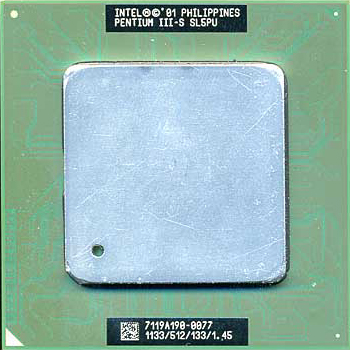X-Bit Labs heeft een review gescoord van een Pentium III-S 1,13GHz. Deze chip is voorzien van de 0,13 micron Tualatin core, maar dan de serveruitvoering daarvan. Dat wil zeggen dat de chip was voorzien van 512KB full-speed L2 cache, in plaats van de 256KB waar de huidige Pentium III, Pentium 4 en Athlon processors het mee moeten doen. In de review test men de chip tegen een 1,3 en 1,4GHz Pentium 4, een normale Pentium III 1GHz, een normale Athlon 1,13GHz en een Athlon MP 1,2GHz. Als moederbord werd gekozen voor een Asus TUSL2-C. Al snel wordt duidelijk dat het een slimme zet van Intel was om de desktop-uitvoering van de chip geen cache-upgrade te geven, hij weet namelijk in veel gevallen de Pentium 4 met RDRAM te verslaan, verrassend genoeg zelfs met FlasK MPEG4 encoden. In office benchmarks kan zelfs de Athlon MP met Palomino core en PC2100 DDR geheugen hem niet bijhouden. Dit belooft nog heel wat goeds voor Northwood, de 0,13 micron die-schrink van Pentium 4 met een gelijke hoeveelheid cache:
Upsettingly, Tualatin arrived too late. Its market niche is strongly occupied by the youngest Pentium 4 models. So, taking into account that both: Tualatin based Pentium III and Pentium 4 require a new mainboard, Pentium 4 still looks more attractive as it offers broader upgrading possibilities. Furthermore, Intel's pricing policy doesn't encourage anyone to buy a Tualatin based CPU pricing two or even three times higher than equally fast Pentium 4 processors.
Nevertheless, Tualatin core itself won't get lost in the mists of time, however. It will soon find its place in the new Celeron line. To tell the truth, these CPUs won't be perfect either. They'll use an even slower 100MHz system bus, which is to become the major bottleneck of Celeron based systems. On the other hand, Celeron processors based on the Tualatin core should boast splendid overclockability. This happy trait will probably help them find a key to the users' hearts. Anyway, we'll have to wait till the fourth quarter, when there is enough evidence in favor or against the new Celeron family.

